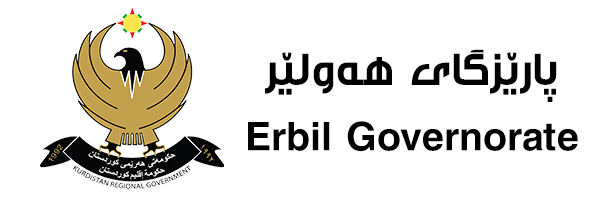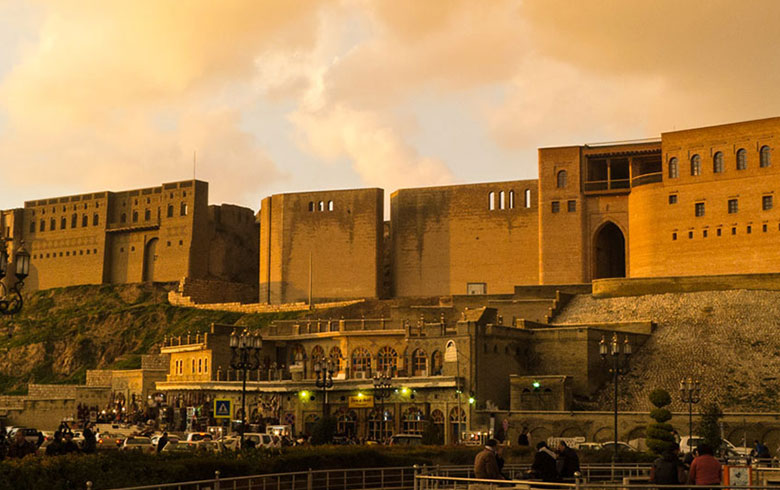Erbil Governorate
پارێزگای هەولێر
لەسەردەمی عوسمانلییەكان هەولێر قەزایەك بووە سەر بە لیوای موسڵ، بەڵام دوای نەمانی ئەوان و هاتنی ئینگلیز بۆناوچەكە، ئالوگۆڕ بەسەر شێوەی فەرمانداری دامو دەزگاكان هاتووەو جۆری بەڕێوەبەربردنی نوێ هاتووەتە ئاراوە. دیارە هەولێریش سەردەستەی ئەم گۆڕانكاریانە بوو، لەسەردەمی ئینگلیزەكان (حاكم سیاسی) لەلیواكان كاریان كردووە، یاریدەدەری دادوەری ڕامیاریش واتە (مساعد لحاكم السیاسی) لەقەزایەكان دانیشتوون (دەبلیو- ئار-ئێچ) كەئەفسەرێكی ئینگلیزە، یەكەم یاریدەدەری دادوەری رامیاری بووە لەهەولێر، پاشان كە هەولێر بووەتە پارێزگا هەر بەخۆی بووە بە دادوەری ڕامیاری ئەم شارە، لەپەرتووكی (دوو ساڵ لەكوردستان ) كە بیرەوەرییەكانی خۆیەتی بەمجۆرە باس لەمگۆڕانە دەكات:
كاتێ سوپای ئینگلیز عێراق و كوردستانی داگیركرد، لە 27/10/1918 شاری كەركووكی گرت، لەكۆتایی هەمان مانگ(پردێ)شی كۆنتڕۆڵ كرد پاشان لە 30/10/1918 ئاگربەست لەنێوان هاوپەیمانەكان و توركیامۆركرا. بڕیارەكەش لە (31)ی هەمان مانگ كاری پێ دەكرێ، ئەوكاتە (دەبلیۆ- ئار ئێچ) لەمەندەڵی دەبێت فەرمانی ئەوە دەردەچێت بكرێتە یاریدەردەی دادوەری ڕامیاری لەپردێ. ڕۆژی 3/11/1918 دەگاتە پردێ و دەست بەكاری خۆی دەكات. لە 7/11/1918 بروسكەی بۆ دەكرێ بچێتە كەركووك بۆ لای (مێجەر نوئێل) كە دادوەری رامیاری كەركووك وهەڵسوڕێنەری ڕێنمایی سیاسەت دەبێ، لەباشووری كوردستان، بەمەبەستی ئامۆژگاریكردنی دەربارەی ئەو سیاسەتەی كەپەیڕەوی دەكەن، لەمكاتەی لە كەركووك دەبێ بروسكەیەكی پێدەگات بۆ ئەوەی ئەفسەرێكی سیاسی لەگەڵ هێزێكی بچووك ڕەوانەی هەولێر بكەن تا بەگوێرەی بەندەكانی ئاگر بەست هەولێر دەستبەجێ لەتوركەكانی وەربگرن، ئەم كارەی (نوئێل) بە (دەبلیۆ-ئار-ئێچ) دەسپێرێ) و بەمجۆرە نامەیەكی سەرپێی لەفەرماندەری هێزی كەركووك وەردەگرێ و بەرەو هەولێر دەچێت. ڕۆژی 10/11/1918 كاتژمێر(1) ی دوای نیوەڕۆ دەگاتە هەولێر، دوای پێشوازیكردن نیوەڕۆ لای (ئەحمەد ئەفەندی) میوان دەبێ، دوای نانخواردن كاتژمێر (3) ی نیوەڕۆ دەچێتە ئۆردوگای توركەكان لە ڕۆژئاوای هەولێر، نامەكە دەداتە فەرماندەی هێزی توركەكان كەپیاوێكی كورتە باڵای قەفقازی دەبێت ئەمیش دوای خوێندنەوەی نامەكە ڕەزامەندی دەردەبڕی كەوا بەیانی هەولێر جێبێلێ، بەڵام پێشنیاز دەكات كەوا نەخۆشخانەكانیان لەهەولێر بمێننەوە لەوەڵامدا(ئێچ)دەڵێ: "منیش مكوڕ بووم لەسەر ئەوەی كەوا پزیشكێكیان لەگەڵ بەجێ بێڵێ، بەڵام فەرماندە توركەكە ئەمەی رەتكردەوەو بەڵێنی داكەوا نەخۆشەكان لەگەڵ خۆیان بەرن" پاشان دەركەوت كەوا هەموویان بەسەر ماڵە هەولێرییەكانی دابەش كردبوو ئینجا (ئێچ) دەڵێ:
ئەفسەرێكی توركم لەگەڵ خۆدا هێنا بۆئەوەی كۆگاكانم تەسلیم بكات"، لەپاشان ئێوارە لەدیوەخانی ئەحمەد ئەفەندی میوان دەبێتەوە وبەیانی دەچێت فەرماندە توركەكە بەڕی دەكات و دوایی چاوی بەپیاو ماقوڵ و ڕیش سپییەكانی هەولێر دەكەوێت و دەربارەی بارودۆخەكە قسەیان بۆ دەكات، لەم ماوەیەدا كە (ئێچ) لە هەولێر دەبێت.
بروسكەیەك دەكرێ كەوا (نەقیب موری) لە هەولێر دامەزراوە و پێویستە (ئێچ) بگەڕێتەوە بۆ پردێ بەم پێیە ڕۆژی (13/11/1918 ) نەقیب (موری) دەگاتە هەولێرو (ئێچ) جڵەوی كاروباری دەداتە دەست و بەجۆی دەگەڕێتەوە پردێ.
لە ڕۆژی (15/2/1918) جڵەوی كاروباری ئەم ناوچەیە بەڕێوەدەبات، پاشان مۆڵەت وەردەگرێ و دەچێتەوە لەندەن، تا لەڕۆژی (30/6/1919)لەڕێگای حەلەب دەگاتەوە موسڵ لەوێ یەكسەر فەرمانی پێدەدەن بگەڕێتەوە هەولێر بۆ ئەوەی پلەی یاریدەدەری لەدادوەری رامیاری لە (مۆر) وەربگرێتەوە.
لە رۆژی 3/7/1919 دەگاتەوە هەولێر و دەست بەئیشوكاری خۆی دەكات، لەم ماوەیەدا چەندین پێشنیازدەكرێ بۆ ئەوەی هەولێر بكرێتە پارێزگایەكی سەربەخۆی جیاواز لەموسڵ، كە قەزای كۆیە( تا ئەو وەختە سەر بە سڵێمانی بوو) لەگەڵ رەواندز بگرێتە خۆ، دیارە ئەم جۆرە پێكهاتەش سوودی زۆر بووە، چونكە تاكە ڕێگایەكی لەبارو گونجاو بڕوات بۆ رەواندز بەهەولێر تێدەپەڕێ، كۆیەش ئاسانتر دەیتوانی پەیوەندی بە هەولێرەوە بكات وەك سلێمانی (دەبلیو-ئار-ئێچ) دەڵێ:
" لەڕۆژی 29/10/1919 لەگەڵ (ئەحمەد ئەفەندی) سەرۆكی شارەوانی هەولێر بەشەمەندەفەر لەڕێگای شەڕگاتەوە چووین بۆبەغداد بۆ ئەوەی لەگەڵ(عەقید ویلسون)، دادوەری گشتی مەلەكی لەعێراق گفتوگۆلەسەر ئەم پێشنیارانە بكەین و بگەینە بڕیارێك. ئینجا گووتی:" ویلسون گێولی مەیلی لەوەرگرتنی پڕۆژە نوێكە نەبوو بەر بەوەرگرتنیشی تا دەرفەتی بۆ بڕەخسێ سەردانی (مستەربل) بكات لەهەولێر و ئامۆژگارییەكانی پێشكەش بكات".
هەروەها دەڵێ:" چوار پێنج رۆژ لە بەغدا ماینەوە لە ئێوەرەی ڕۆژی (31/11/919) یەك دووكاتژمێرپێش ئەوەی بگەڕێمەوە، عەقید ویلسون جیایكردمەوە پێی ڕاگەیاندنم كەوا بارەگای گشتی هەواڵێكی پێگەیشتووە كەوا (مستەر بل) دادوەری رامیاری موسڵ لەگەڵ نەقیب( كی. سكوت) یاریدەدەری دادوەری رامیاری لە ئاكرێ هەردووكیان لە( بیرە كەپرا) لە ناوچەی زێبارەتی كوژراون" بەمجۆرە دەڵێ:" بەدڵێكی پڕ لەژان و كەسەرەوە ئەم رووداوە چاوەڕوان نەكراوەمان پێگەیشت". لەپاشان دەڵێ:" لەرۆژی (4/1/11919) گەیشتمەوە هەولێر، ئەم رووداوە لەناو خەڵك بڵاونەبووبۆوە، پاش چەند رۆژێك نەبێ نەكەوتنە سەرزاری خەڵكی شار. مێژووی بهپارێزگابوونی شاری ههولێر، له ژماره 884ـی رۆژنامهی عێراق كه له 12ـی نیسانی ساڵی 1923 دهرچووه، ئاماژهی پێكراوه، كه لهیهكی تشرینی دووهم 1919 ههولێر بووه نیمچه لیوایهكی سهربهخۆ، بهشێوهیهك كه سهر به لیوای كهركووك بوو، لهساڵی 1923 به تهواوهتی بووهته لیوای سهربهخۆ، كه راستهوخۆ سهر به وهزارهتی ناوخۆی عێراق بوو، ئهحمهد عوسمان كرایه مهتهسهریفی ههولێر، مووچهی مانگانهشی 1000 رووپیه بوو، كه پێشتر ناوبراو سهرۆكی شارهوانی ههولێر بوو و له ئێستادا 100 ساڵ بهسهر پارێزگابوونی شاری ههولێر تێپهڕ دهبیت.

